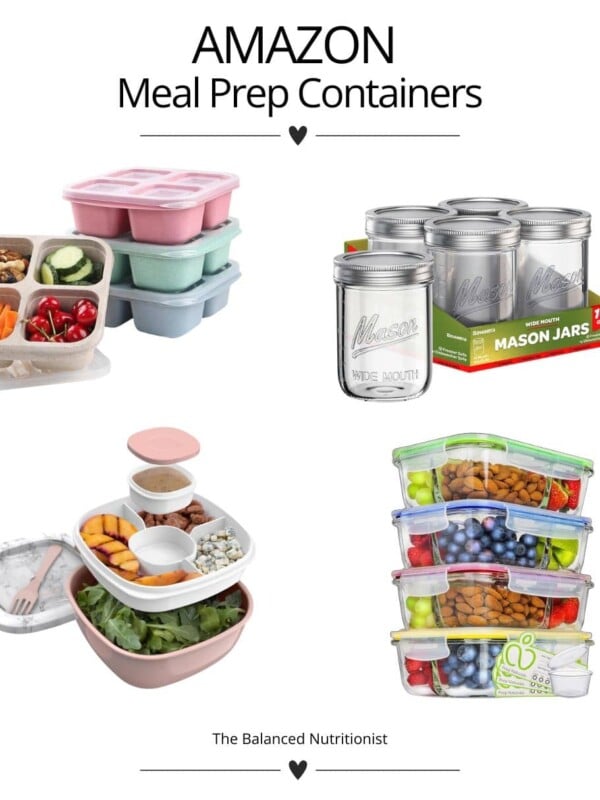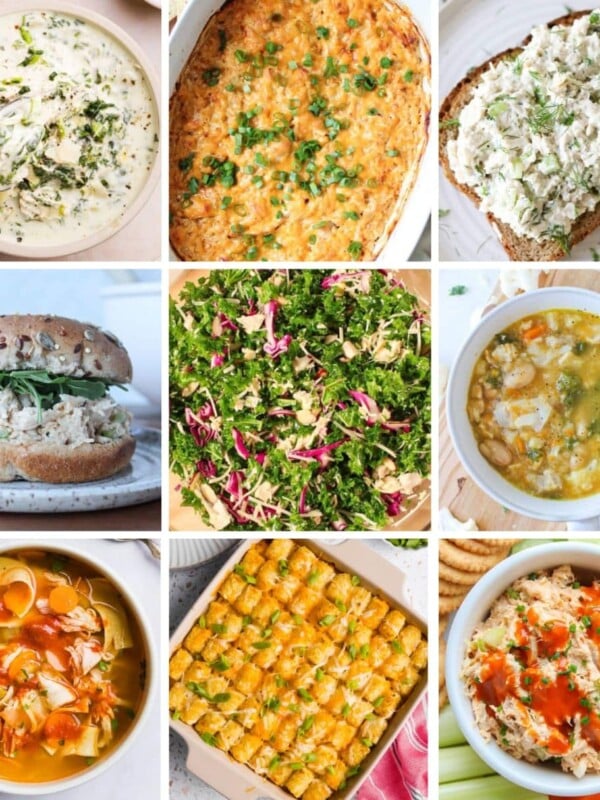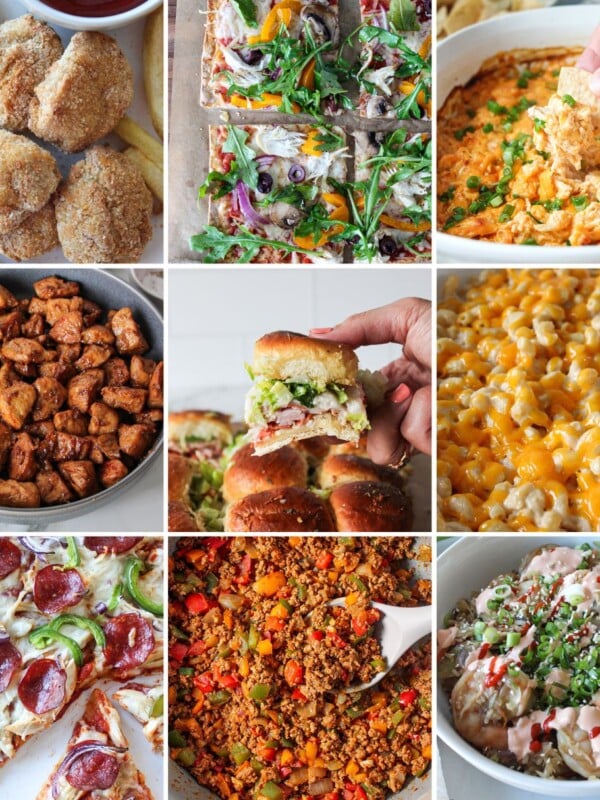Why Do I Keep Eating After I’m Full (And What to Do About It)
On Nov 12, 2022, Updated Jan 31, 2024
This post may contain affiliate links. Please read our disclosure policy.

You’ve polished off every delicious morsel on your plate, and you feel full – maybe even too full – but some small part of you says “go ahead, get dessert too.” You contemplate a sweet treat and wonder,
“How am I still hungry?”
You’re frustrated but you’re still dying for something sweet. You decide dessert is in your future, but just a bite. And then – dun dun dun –- to your own amazement you finish every last bite of that delectable German chocolate cake slice.
Your stomach feels full and uncomfortable from the food…not to mention the sinking feeling that is brewing.
“Why do I keep eating after I’m full? Again?”
Feelings of guilt, shame, or confusion often surround overeating. Even when we know we’re full we can find ourselves going back for seconds, thirds, and maybe even dessert. Why do we do this?
Hi! I’m Jamie, the Registered Dietitian founder of The Balanced Nutritionist. In this blog post, I’ll be sharing some clues as to why you may overeat (hint: it has nothing to do with lack of willpower) as well as offering some expert advice and tips to help you get to feel comfortable and in control around food.
Ready? Let’s dive into how your belly talks to your brain.
How does our body feel full?
When we eat, there is a lot of communication happening between our brain and stomach. Signals are sent based on our stomach’s stretch, hormones, emotions related to the foods we eat, the sensory experience, and more (1).
Let’s look at two hormones that play major roles in controlling your appetite; ghrelin and leptin.
The hunger hormone – ghrelin – is released by the stomach and says to your brain, “Hey, you’re hungry!” When ghrelin shows up, you’ll likely meander to the fridge or your favorite restaurant to refuel.
Halfway through your dish of creamy alfredo, you feel your stomach start to stretch – one physical signal that shows you’re almost full. Once your body has enough energy, ghrelin levels decrease and its counterpart – leptin – is released. Leptin is made by your fat cells and tells your brain the body has all the fuel it needs for now (2).
However, depending on how quickly you eat, there might be a delay between when your stomach is starting to feel physically full and when your brain will receive the memo; this is one reason that we overeat, which I’ll cover in-depth in a moment.
Meanwhile, when your body receives these signals of fullness (or satiety), your physical hunger is satisfied. So…why do we continue to eat beyond fulfilling our physical hunger? What is it that thwarts our normal biology?
The answer is not as simple as it may seem. There are a lot of factors that cause us to overeat! Let’s take a look at a few of them (and after that, I’ll cover what to do about these causes, so keep on reading!).
Why do we eat past fullness?
Maybe you’re thinking “Why do I keep eating after I’m full? I’m eating regularly!”
While you may be quick to assume that your overeating is because of your own lack of willpower, I can say with confidence that is not the case.
Eating can be complicated, especially with how many fad diets are popular. Here are the most common reasons that my clients have overeaten in the past, starting with not actually eating enough throughout the day.
Skipping meals
Even if you’re not skipping meals, you’re probably not consuming enough over the course of the day. And there are going to be some repercussions come nightfall.
Remember that hunger hormone we talked about? When you cut calories too much, your stomach produces more ghrelin in an attempt to get you to eat when food is available (3).
Eating too few calories leads to stronger hunger pangs and brings obsessive thoughts about food to mind, particularly high-calorie foods (4). Ignoring your natural reminders to eat is a physically and mentally exhausting challenge, and by the end of the day it’s almost impossible to fight your body’s survival instincts; it isn’t willpower, it is biology. Your body wants to protect you and demands that you eat more to make up for the energy deficit and to protect against future calorie deprivation. Because of this, studies have shown short-term dieting actually increases your risk of long-term weight gain (5).
Instead of skipping meals, be sure to eat consistently throughout the day; don’t skip meals and snacks to achieve short-term weight loss; it won’t last! Focus on eating whole, nutrient-rich foods like whole grains and legumes. Add in fresh vegetables, fruits, and protein-rich foods to help you stay satiated longer – such as fish, meats, beans, poultry, or yogurt (6).
Going too long between meals
You may think skipping snacks or waiting a long time before dinner is a quick way to cut out some calories, but think again…
Imagine a bear getting ready for winter. When the temperatures start to drop, Smokey naturally eats massive amounts of food to prepare for the cold, hungry months ahead. When your body is subjected to long stretches of hunger, it does something similar, only on a shorter timeline.
If you get into a cycle of waiting too long between meals, your body recognizes it’s deprived of food, so when you finally do eat, you tend to eat beyond fullness to compensate for missing calories.
To avoid waiting too long, supplement your diet with healthy snacks full of complex carbs (ideally with fiber) or protein to keep you satiated between meals!
Not getting enough nutrients at mealtime
By this point, you may be thinking, “My problem definitely isn’t undereating. I eat plenty throughout the day – too much, actually.”
So…what’s causing the hunger? Even if you’re eating at regular intervals, your body may not be getting the nutrients you need to thrive (7).
For example, ifyour protein source consists of the pepperoni on your pizza, let’s look at some more balanced alternatives. Focus on protein sources that have a bit more bang for their buck like meats, fish, poultry, or a protein shake.
Meals loaded with refined carbs like sugary drinks, white bread, pastries, or other items made with white flour cause a spike in blood sugar, and ultimately a crash that brings on waves of hunger later. Instead, try swappingthe complex carbohydrates mentioned above when you can! Foods like whole grains and legumes aren’t processed as quickly by the body and keep you feeling full for longer (8).
On the other end of the spectrum, it is possible to eat so many veggies your stomach feels full, but you missed out on protein, fat, and complex carbs that help keep you satisfied. Cauliflower rice and kale are healthy, but they don’t offer all of the nutrients you need to fuel your day on their own
Next up? Remember that just because food is on your plate, does not mean that you have to finish it.
Long time member of the “Clean Plate Club”
“You can’t have dessert until that plate is clean.”
“Finish your food; it’s wasteful to throw it away.”
Does this sound familiar? Are you transported back to your childhood home at dinnertime?
If so, you likely grew up as a member of the Clean Plate Club. The good news is that it doesn’t have to be a lifetime membership!
When you’re feeling full, slow down and think about how forcing yourself to eat those last few bites will make you feel. If you’re already satiated, it’s ok to toss the last few forkfuls.
You’re Dehydrated
According to the American Academy of Nutrition and Dietetics, “Mild dehydration is often masked as feelings of hunger when really your body just needs fluids” (9).
Now, this doesn’t mean you should replace needed food with water. But, when our body lacks water, the brain receives mixed signals and might wave the flag of hunger. If you think you might be a little dehydrated and you’re unsure if you’re actually hungry,, drink a glass of water and wait 15-20 minutes to see if the feeling subsides.
Not eating mindfully
It’s easy to overeat when with a phone in hand, the TV on, or when we’re out to lunch with a friend. Or, when we’re home and just feeling bored. (Psst! I have a whole blog about How to Stop Boredom Eating.)
We get so caught up in what we’re watching or in the conversation we’re having that we don’t realize how much we’ve eaten until it’s too late and our stomachs are begging us to loosen our belts.
So; to recap, there are many reasons why we eat past fullness. Now that we understand a few reasons our choices can sabotage our eating plans, let’s look at how mindful eating can keep us from feeling out of control around food.
How to stop eating once you’re full
Ready to learn how to feel in control around our meals? These habits can take some practice to feel natural, but they can help you stop eating past fullness.
Here are a few of my favorite tips that can help you have a more mindful eating experience. By listening to our bodies we can “hear your fullness” loud and clear before it’s too late. But also remember, you don’t need to be perfect! Mindful eating takes practice and it doesn’t have to be used every single time you eat!
- Portion your food on a plate, in a bowl, or in some kind of container. This way you won’t find yourself eating everything you prepared and intended to eat later as leftovers.
- Minimize distractions. Give your food some attention instead of looking at your phone, TV, or work computer.
- Minimize what I call “drive-by eating.” This is when you grab handfuls from the pantry or snacks off the counter as you walk by.
- Slow down. Make time for meals! When we have an action-packed day, it’s easy to scarf down a plate of food, but that can lead to overeating. Try to take time between bites and slow down your eating, even just a little, to avoid becoming overfull.
- Stop eating when you’re satisfied, not stuffed! If you grew up in the Clean Plate Club, this can be a tricky one because it’s become such a habit to eat every last bite. Pay attention so you can really feel your fullness and stop when you’re satisfied.
- Eat foods that you love. When we forbid ourselves from eating foods that we really love (regardless of their nutritional value) those foods can feel incredibly enticing. The more we tell ourselves that the food is off-limits, the more we want them. Instead, practice having foods that you love at home. With time, the siren call of the ice cream or Nutella will wane and they’ll just be there when a craving hits. And because they no longer have such a strong pull, you’ll be able to enjoy the treat without feeling like you’re breaking rules and will never have that food at home again.
Remember, mindful eating takes practice! You’ve eaten since the day you were born and have developed a few habits in that time. Oftentimes, we celebrate with treats, go out with friends to talk over lunch, and hang onto eating habits we were taught as children or developed as we tried different diets.
Food is a big deal in our lives! It’ll take time to make a change, but learning to “hear” your stomach’s fullness cues will help you develop healthier habits and ultimately, a healthier lifestyle.
Key takeaways
By now, you realize there are so many reasons we find ourselves eating past fullness, but there are also ways to fuel ourselves properly, listen to our body’s hunger cues, and stop when we’re satisfied – not stuffed!
Let’s say “goodbye” to the all-or-nothing diet mindset, enjoy ALL the foods we love while prioritizing health, keep our favorite foods confidently in the house without feeling like we’ll lose control, and most importantly make eating stress-free.
Need help getting started? I’ve put together a jam-packed handbook called The Balanced Basics Handbook. It’s your complete starter guide to finding balance with food and building healthy habits. Grab it here!













